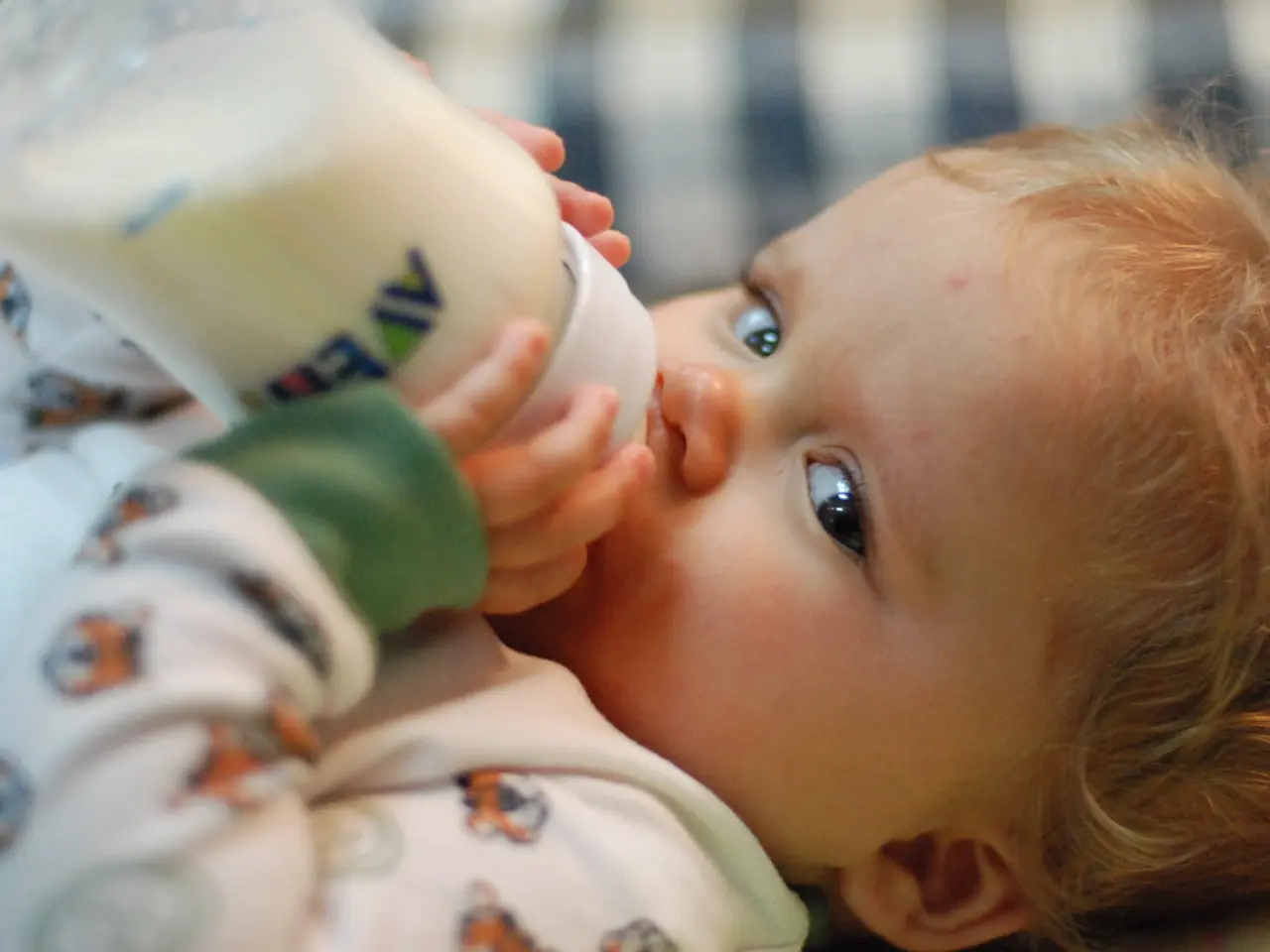Images, signs, and remedies for infant milk allergy and related stool changes
Cow's milk allergy is a common condition in infants, affecting a significant number of babies. Here's what you need to know about this allergy and its symptoms.
Recognising Cow's Milk Allergy
When it comes to cow's milk allergy, loose or watery stools with mucus and blood are common stool characteristics to watch for, rather than stool color or frequency alone[1][3]. Other symptoms may include vomiting, colic, diarrhea or constipation, hives, upset stomach, and weight loss[2][4].
In some cases, babies may experience nonclassical signs of anaphylaxis, such as ear pulling, tongue thrusting, fussiness, and increased clinginess[5]. In rare cases, a baby may have a serious allergic reaction to milk, resulting in anaphylaxis, which can be life-threatening[6].
Diagnosis and Treatment
An allergist may suggest a skin prick test to diagnose a milk allergy, which involves waiting 15 to 20 minutes for a rash or welt to appear[7]. If the baby drinks formula, a doctor will recommend switching to an extensively hydrolysed, or elemental, formula[8].
If skin testing does not help with diagnosis, an allergist will recommend excluding milk from the diet and then reintroducing it to see if a reaction occurs[7]. The best treatment for a milk allergy is to avoid milk and foods containing it.
Outgrowing Cow's Milk Allergy
About 80% of children will outgrow a cow's milk allergy by the time they reach 16 years[9]. However, those who do not outgrow the allergy usually need to avoid milk and dairy products. Consuming dairy in baked goods may help build up a tolerance, but caregivers should talk about this with an allergist before trying it at home[10].
Caring for Your Baby
When introducing solid foods, parents and caregivers should pay attention to food labeling and avoid all products that contain dairy[11]. Some products that may contain dairy include milk, butter, yogurt, custard, cheese, cream, pudding, some baked goods, ice cream, and certain plant-based milk alternatives.
If someone suspects their baby has a cow's milk allergy, they should speak to a pediatrician, who may recommend an appointment with an allergist[12]. A parent or caregiver should contact a doctor immediately if they notice blood in a baby's poop[13].
In conclusion, understanding cow's milk allergy in babies is essential for ensuring their health and wellbeing. By recognising the symptoms, seeking medical advice, and taking appropriate steps to manage the allergy, parents and caregivers can help their babies live a happy and healthy life.
- A caregiver may observe loose or watery stools with mucus and blood as common characteristics of cow's milk allergy in a baby.
- Vomiting, colic, diarrhea or constipation, hives, upset stomach, and weight loss are other symptoms of cow's milk allergy in infants.
- Babies might also exhibit nonclassical signs of anaphylaxis, such as ear pulling, tongue thrusting, fussiness, and increased clinginess.
- Anaphylaxis, a rare but serious allergic reaction to milk, can be life-threatening.
- An allergist may suggest a skin prick test to diagnose a cow's milk allergy, and a rash or welt might appear after 15 to 20 minutes.
- If the baby drinks formula, an extensively hydrolysed or elemental formula would be recommended by a doctor.
- If skin testing does not help with diagnosis, an allergist will recommend excluding milk from the diet and then reintroducing it to see if a reaction occurs.
- The best treatment for a milk allergy is to avoid milk and foods containing it.
- About 80% of children outgrow a cow's milk allergy by the time they reach 16 years.
- Consuming dairy in baked goods may help build up a tolerance in children who do not outgrow the allergy, but caregivers should consult an allergist before trying it.
- When introducing solid foods, parents and caregivers should pay attention to food labeling and avoid dairy products.
- If someone suspects their baby has a cow's milk allergy, they should speak to a pediatrician, who may recommend an appointment with an allergist.
- A parent or caregiver should contact a doctor immediately if they notice blood in a baby's poop.
- Digestive health is crucial in understanding cow's milk allergy in babies.
- Migraines and chronic diseases like Crohn's disease and psoriasis can also be related to milk allergies.
- Food allergies, such as lactose intolerance, require careful consideration of a baby's nutrition.
- Breastfeeding is a natural choice for infants, but caregivers should be aware of the possibility of allergies transferring through mother's milk.
- In some cases, formula may be necessary, and caregivers should choose one that is free from allergens.
- Apart from allergies, mental health conditions like depression and anxiety can also affect a baby's overall health.
- Sleep, cardiovascular health, respiratory conditions, eye-health, hearing, fitness-and-exercise, sexual-health, family-health, autoimmune-disorders, neurological-disorders, and skin-conditions are all essential aspects of health-and-wellness.
- With the advancement of science, various therapies-and-treatments, medication, and nutrition have been developed to manage and alleviate the symptoms of chronic diseases like cancer and various medical-condition.




